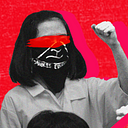Unite and Struggle for a Patriotic, Mass, and Scientific Educational System! Junk the Anti-people “Blended Learning” Program! — KM-Southeast Negros
When the COVID-19 pandemic, and the resulting disaster of crisis proportions due to the US-Duterte regime’s neoliberal economic policies, the people’s sufferings and hardships have been made worse, in terms of food consumption, work and livelihood, education, health, and other basic human needs.
For the masses of settlers inhabiting the mountainous communities in the 3rd district of Negros Oriental, who are already economically distressed, the difficulty of availing of education has worsened, due to the present “blended learning” program.
Given the choice between online and modular learning, most students and their parents practically can only opt for the latter, since in the hinterlands internet signal / coverage is not a luxury that they have, aside from the question of purchasing the necessary gadgets, which is somewhat problematic given that they already struggle to put food on the table, can barely afford to purchase dried and salted fish, onions, garlic, salt, cooking oil, milk / coffee, sugar, and other kitchen / cupboard needs.
In the case of modular learning, what is overlooked is the fact that most parents in the settler communities barely finished elementary. Only a fortunate few have even reached, not to mention finished, high-school. In one particular Sitio, only a single individual living there was able to finish high school. As a result, due to the arrangement of parents serving as teachers, most families decided to postpone their children’s education, and wait for the resumption of normal face-to-face schooling.
The present blended learning program is not in correspondence with the reality faced by Filipino parents and their student children, the vast majority of which are based in the countryside.
The current, actual conditions are such that much of the waking time of peasant families is devoted to production, chiefly for their subsistence, food consumption and other material needs; aside from their already heavy workload, the blended learning program makes them carry the additional burden of teaching their children, in the case of modular distance learning, making their lives that much more stressful as it is, given that peasant householders usually dedicate most their time to production, sometimes even missing out on attending to household duties and quality-time with family, due to the sheer busyness with the farm and other sideline occupations.
With regards to online learning, it’s not only the gadgets, internet connection, load / data costs that are the obstacles and problems. The primary issue is that, in the prevailing conditions affecting the majority of peasant families in much of the countryside, households act as a unit in production and collectively, as a family, endure various forms of feudal and semi-feudal exploitation.
Furthermore, blended learning adds another layer of burden on the part of teachers, who are already troubled with the lack of finances, lack of ample training and practice, lack of facilities, and others.
In essence, the blended learning program is anti-people. It does not root itself in the concrete situation faced by parents and students.
Blended learning is not an appropriate solution to the problems faced today in the field of education. Pressingly, the education budget, in terms of wages, training, facilities, along with other basic services need to be pushed and struggled for.
There is no other solution to achieve an educational system that’s truly in the service of the youth other than to struggle for a patriotic, mass, scientific educational system. This can only be actualized through solid unity of the people, perseverance in waging the national democratic revolution through protracted people’s war.
